Anaïs Espinoso’s research on how to improve the treatment of epilepsy by analysing brain signals wins the Rin4’
Anaïs Espinoso’s research on how to improve the treatment of epilepsy by analysing brain signals wins the Rin4’
Anaïs Espinoso’s research on how to improve the treatment of epilepsy by analysing brain signals wins the Rin4’
The UPF doctoral student of Information and Communication Technologies won first prize and the audience award at the eighth edition of the University’s scientific outreach competition in which researchers, in four minutes, explain their doctoral theses to a non-specialist audience.
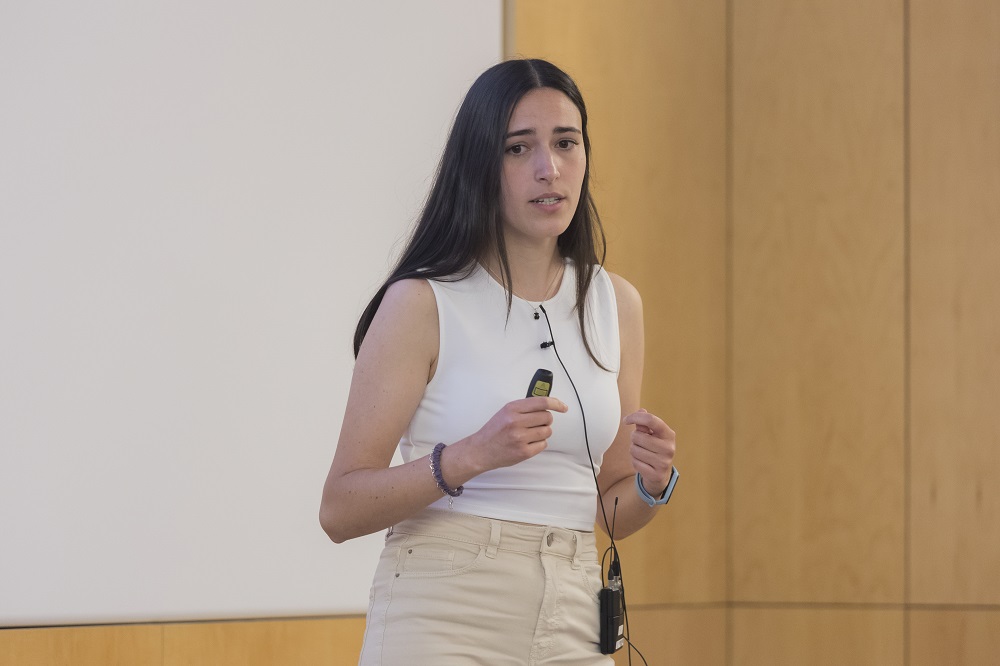
Phase studies to analyse the brain signals of patients with epilepsy is the title of the presentation given by Anaïs Espinoso Palacín, a doctoral student of Information and Communication Technologies at UPF, with which she was proclaimed the winner of the 2023 edition of Rin4’ (Research in Four Minutes). It is a scientific outreach competition, organized by the UPF Doctoral School since 2015, which aims to promote the University’s doctoral students’ communication skills.
Thus, Anaïs Espinoso, who assured that the goal of her research was to “improve the quality of life of people with epilepsy”, won first prize in the competition, endowed with 900 euros, and will represent UPF in the final phase of “Present your thesis in 4 minutes” organized by the Catalan Foundation for Research and Innovation (FCRI), with the participation of the twelve universities of Catalonia, scheduled for 22 June at CaixaFòrum Lleida.
Anaïs Espinoso will represent UPF in the final phase of “Present your thesis in 4 minutes” organized by the FCRI, with the participation of the twelve universities of Catalonia
The final of Rin4’ at UPF, which was streamed, took place in the afternoon of 18 May in a packed multipurpose room of the Mercè Rodoreda building on the Ciutadella campus, with an expectant audience, eager to listen to the presentations of competition’s the ten finalists: seven female and three male doctoral students who qualified after passing a knock-out phase involving 24 people who are currently doing their theses at UPF.
The event, which was hosted by Emma Rodero, a full professor of the Department of Communication, was attended by Laia de Nadal, UPF rector, and the members of the jury: Vanessa Daza, vice-rector for Knowledge Transfer; David Comas, director of the Doctoral School, and Núria Sebastián, a full professor of Psychology at the Department of Information and Communication Technologies (DTIC) and former director of the School.
The finalists, whose presentations demonstrated the quality of the research that is conducted at the University, belong to six different doctoral programmes: Biomedicine (4), Translation and Language Sciences (2), Information and Communication Technologies (1), History (1), Humanities (1) and Communication (1).
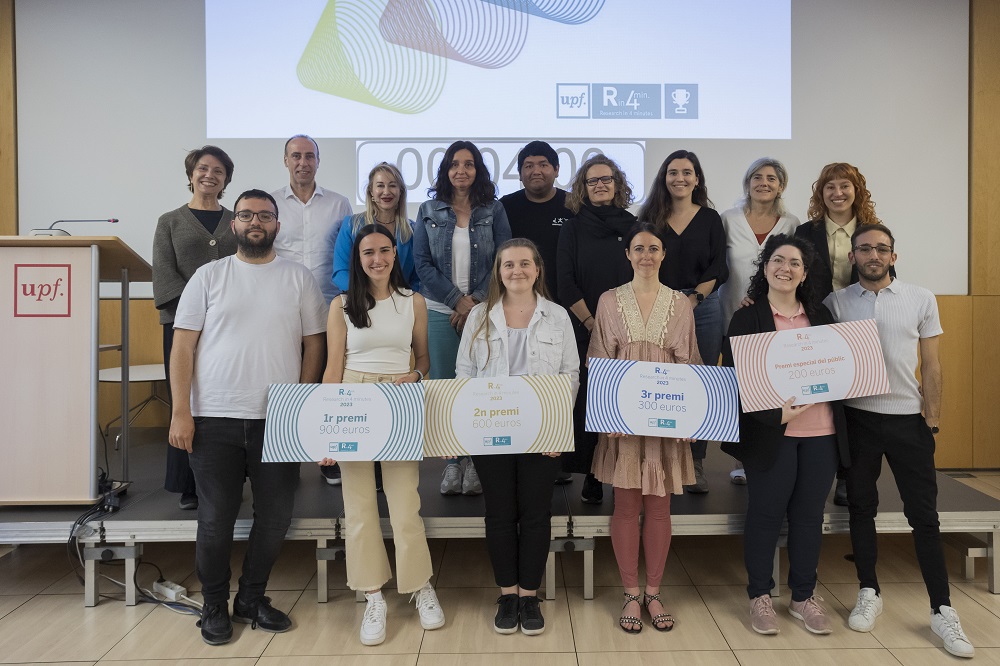
Analysing brain signals to identify the part of the brain affected
The research Anaïs Espinoso is conducting studies the brain signals of patients with epilepsy: the ICT doctoral student explained that there is a certain group of people with this disease (approximately 10%) who are not helped by medication. Alternatives must be sought for their treatment, and one of them is to extract a small part of the brain. Therefore, “I analyse the brain signals of patients, to try to identify this part of the organ that will need to be surgically removed”.
“I analyse the brain signals of patients, to try to identify this part of the organ that will need to be surgically removed”
To remove this part of the brain, it is necessary to know where the epileptic focus is, which requires many hours of analysis of brain records, and is performed by physicians and engineers. Anaïs Espinoso pointed out that it is necessary to differentiate the measured signals of the epileptic focus (constant and synchronized) and those outside the epileptic focus (irregular and inconstant). To clarify this, she gave a highly illustrative example of runners who were going at different rhythms: “Since I do phase analysis, with things turning around a circumference, I looked for the example of runners”, she explained.
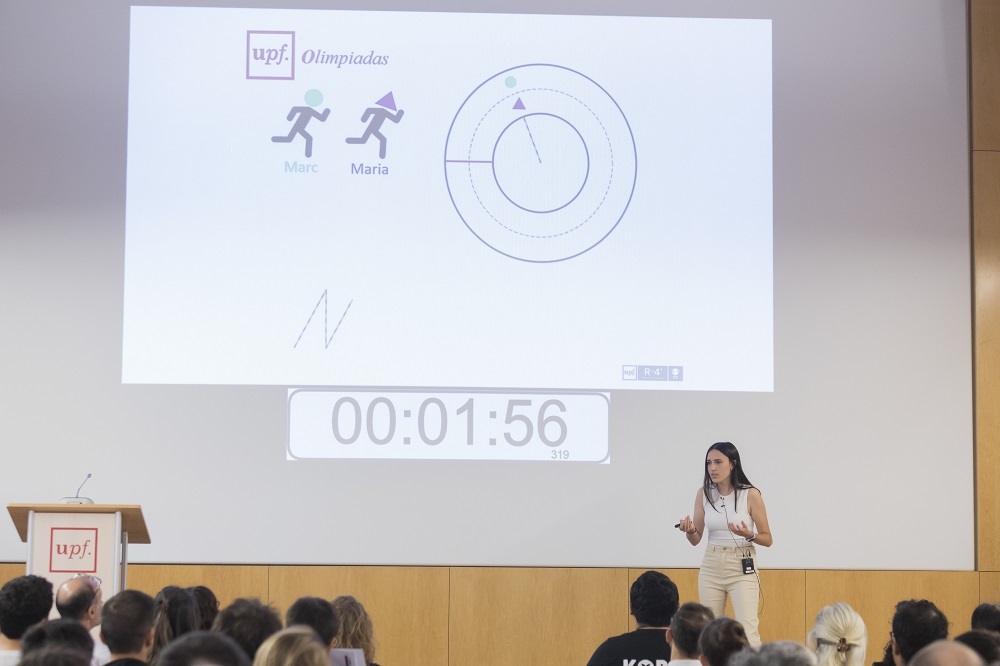
How viruses affect mosquitoes and a group of forgotten Russian writers, the central themes of the second and third prizes
Mireia Puig i Torrents, a PhD student of Biomedicine, with her presentation “The allies of emerging viruses”, won second prize, endowed with 600 euros. “What is the most dangerous animal in the world?”, the doctoral student asked the audience: “Mosquitoes! They cause more than 700,000 deaths each year, with viruses such as dengue or west Nile virus, which have already been detected in our country, transmitted by the (Asian) tiger mosquito. The researcher explained that there were two different types of viral infections, in people and mosquitoes, and that she focuses on the latter, of which little is known. Specifically, her thesis analyses how viruses induce cell translation ability and how this affects the production of proteins in mosquitoes, with the ultimate goal of “preventing the transmission of these viruses to humans”.
Olga Tikhonova, a PhD student in Humanities, won third prize, endowed with 300 euros, with “OBERIU: the poetics of the absurd. An episode in the Russian literary avant-garde”. She explained that at the beginning of the 20th century there was a group of young Soviet writers and artists, OBERIU (“union”, in Russian), who “experimented with different lives and had one thing in common: they all rejected the past”. Their style was based on rules without grammar, invented words, drawings of geometric figures, poetry without logic, stories of black humour, etc., and "although they were extraordinary, they were forgotten, basically because Stalin wanted to control literature and did not like the fact that they did not mention Soviet values”. The purpose of Olga Tikhonova’s research, she affirmed, “is remove this group from oblivion, to favour the translation of their works into Catalan and Spanish, and to show that culture cannot be produced under a dictatorial regime”.
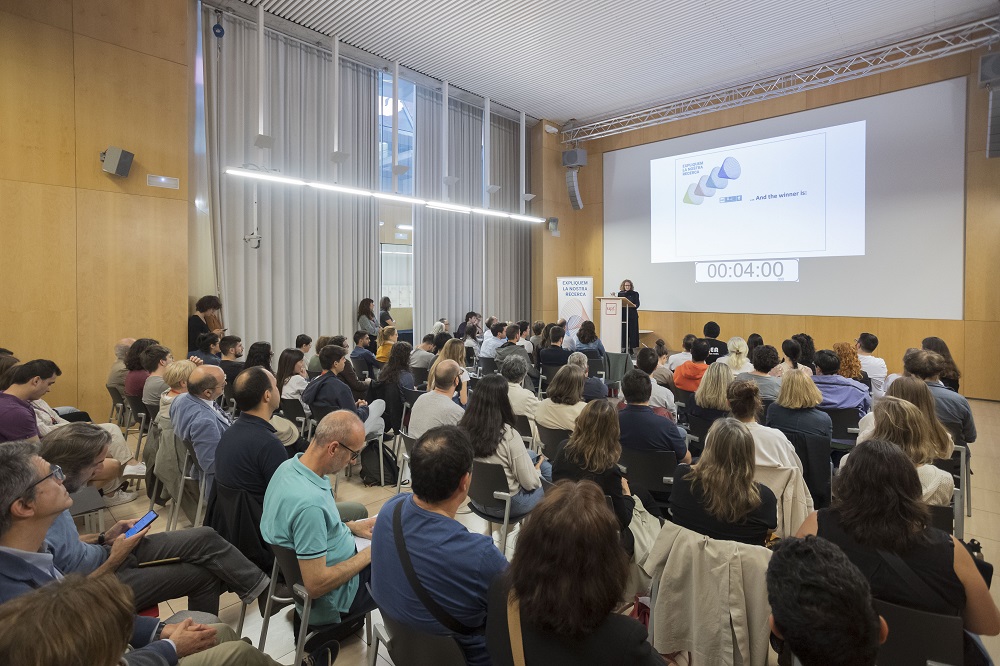
A tie in the audience award
In addition to winning the first prize, Anaïs Espinoso won a second prize with the audience award, endowed with 200 euros, after those in attendance expressed their preferences by filling out a slip handed out to them at the entrance. She tied with Sara Sanz i Ureña, a PhD student of Biomedicine, who presented “What is the relationship between a kidney transplant and pregnancy?”, research based on blood analysis that seeks to help pregnant women who need a kidney.
The other participants in the final were Anna Oncins Suñol, a PhD in Biomedicine, with “Lymphoma: are we predestined?”; Rodolfo Joel Zevallos Salazar, a PhD in Translation and Language Sciences, with “Language models for languages with little data”; Marc Palmada Flores, a PhD in Biomedicine, with “The book of life. Generating genomes”.
The other finalists were Karma Peiró Rubio, a PhD in Communication, with “Journalism of algorithmic accountability”; Nicolás Ariel Panzuto Piccini, a PhD in Translation and Language Sciences, with “Battle of languages: variation of Spanish on YouTube”, and Daniela Dias Ortega, a PhD in History, with “Plants in the past: archaeology in Central Brazil”.
Doing quality research and its communication: fundamental for the University
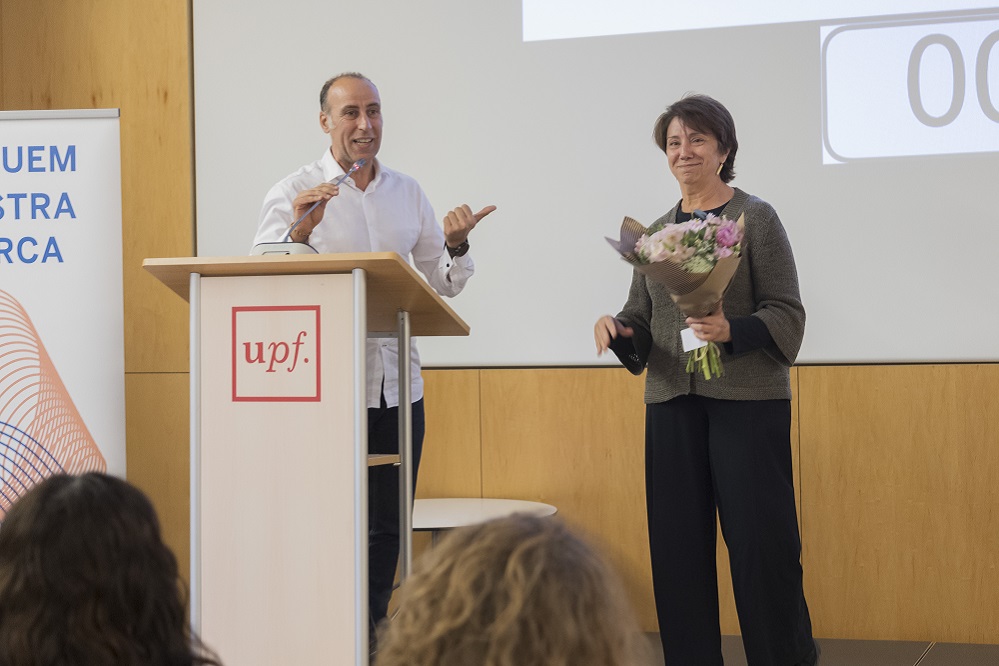
At the end of the event, Laia de Nadal, UPF rector, gave a speech in which she stressed that Rin4’ is an event much loved by the University: “One of the essential pillars of UPF is to carry out quality research. But if you don’t convey it, it seems not to exist”. She emphasized the importance of communicating research, in different ways and formats, sometimes opting for a short version: “It is not easy synthesize, although these young researchers already have this skill in their DNA. I would like to congratulate the 24 participants in the competition on the effort you have made”. The rector also stressed the importance for the University to feed back to society and explain what it does, since “we are not an ivory tower”.
Previously, David Comas, director of the UPF Doctoral School and member of the jury, reiterated his gratitude to all the participants, and acknowledged the task of Núria Sebastián, former director of the School, who promoted and organized Rin4’ since its inception, in 2015. The audience responded with a warm round of applause. For David Comas, this event is very important for the Doctoral School, as “it allows presenting and visualizing the quality research that is being carried out at the University in a quick, simple and enjoyable way to all kinds of public. For us it is a cause of pride and an acknowledgement of all doctoral students who are currently doing their doctoral theses at UPF”.

